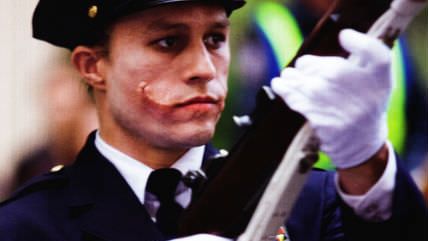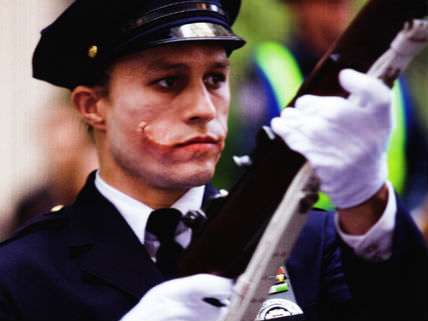Even Batman Addresses Police Brutality in Latest Issue
The billionaire vigilante who takes the law into his own hands is still a hero, of course.


The latest issue of Batman, the comic book about a billionaire vigilante who dresses as a bat to inflict violence on street criminals he catches in the act, follows Superman, the other flagship DC Comics superhero series, in addressing the issue of police brutality within its pages.
If it seemed a stretch to shoehorn issues of police brutality in Superman—a story about an alien who uses his superpowers to nanny over the world—it's doubly so for Batman, a story about a vigilante who takes justice into his own hands. The criminals Batman pursues don't get due process. No one really questions whether Batman uses too much force. He bristles at the idea of oversight from police officers, let alone the kind of civilian oversight seen as one of the policy solutions available to limit police brutality.
Eight years ago, The Wall Street Journal drew a comparison between Batman and George W. Bush, specifically vis a vis the war on terror and in regard to the movie The Dark Knight. Both, wrote Andrew Klavan, displayed "fortitude and moral courage" for confronting enemies "in the only terms they understand." For both the fictional billionaire vigilante and the very real U.S. president, wrote Klavan, emergency conditions trumped certain civil rights concerns, and you could trust both to restore civil rights when the emergency passes.
Not everyone appreciated the comparison. By 2008, Batman may have been more popular than George W. Bush. But neither was the comparison baseless. Batman has always represented the ability of an individual, with sufficient resources and skill, to demand justice and extract something like it, through the force of will alone. It's not a stretch, I think, to call him a fascist. And I write that as someone who, pressed to pick a "favorite superhero," would almost certainly pick Batman.
In the "very special" issue of Batman, the vigilante finds an unarmed, hooded black teenager who has been shot fatally by a long-time Gotham police officer. Spencer Ackerman provides a synopsis and talks to the lead writer of the comic. Via The Guardian:
What begins as A Simple Case – the title of the issue – becomes a meditation on the meaning of a rich, white vigilante who attempts to solve intractable urban problems by beating up bad guys.
"This issue is meant to be a thesis about what our Batman is," lead writer Scott Snyder told the Guardian.
"We've tried to be pretty relentlessly on-point about him being a symbol of inspiration in the face of tremendous fear, as opposed to a symbol of punishment, or a symbol of revenge, taking the city away from criminals. Here is where he begins to learn [the limits of] the methods that he thought would work: finding a criminal, making an example of the criminal, throwing the criminal in jail … Instead, what he has to learn is that the problems that he's facing in today's city are much more humbling, are much more complicated."
Will he learn that Gotham's problems are not problems one man can solve, whether he's at the head of a government or a government onto itself? Probably not. The "great man theory" is pretty essential to the contemporary superhero tale. We consider superheroes heroic in part, I think, because that's what we've been primed to do. But often they're not. Mark Millar's Superman: Red Son made that point starkly. In Red Son, Kal-El, the alien better known as Superman, lands as a baby in the Soviet Union not the U.S., making him a "bad guy" from the American perspective. But all the inclinations the Soviet Superman displays—to control people, for their own good, of course—are shared by the "American" Superman as well.
The same goes with Batman. While Batman makes a thing out of never using deadly force, the Batman stories also make clear that Batman is an extraordinary person, not an ordinary one. While seeing Batman respond to contemporary policing issues is interesting, and I'll probably pick up #44 to see what they do with the story (the writers promise it won't be a "one-off.")
But in the end, I find it difficult to see DC Comics agreeing to a story that might not only tarnish Batman's image as a hero but add an asterisk to it forever, not just until the current run is done. That would be the far more interesting story for tackling issues of police reform. Batman is a hero, in the fictional city of Gotham, and in the real United States, because he takes justice into his own hands, because he appears to be trustworthy, someone whose on the spot decisions about criminals will almost always be correct.
But we don't live in a world of superheroes. One component in the problem of policing in the United States is how much of the public is willing to give how much deference to law enforcement in the course of their performing their duties. A good chunk of the public, and many police officers and their boosters, see the cops as heroes if not superheroes. And "traditional" superhero stories have taught us superheroes don't make mistakes. In the last year, the issue of police brutality has rocketed to center stage in the national discourse. But the problem of police brutality isn't new, it's just been ignored. That's a fascinating question I think comics like Batman can explore.
To me it's no coincidence I've seen far more cops in my life with Batman decals (or fetishes) than Superman ones. Certainly it's not a stretch to connect the Batman story to the idea, shared by many police apologists and advocates of reform, that policing would get better if only better people were cops. That's a dangerous contribution Batman's made to the discourse on policing already, long before Ferguson brought it to the attention of comic writers and executives.
There's promise in a story about Batman investigating the excessive use of force by a police officer and the broader implications of it, even if we know which answers are going to be trotted out (systemic problems difficult to fix) and which ones will be ignored (laws providing for different standards for criminal cops than plain criminals) But there seems to be more promise in a story investigating Gotham's, and our, misguided conception of Batman as a hero in the first place.


Show Comments (63)